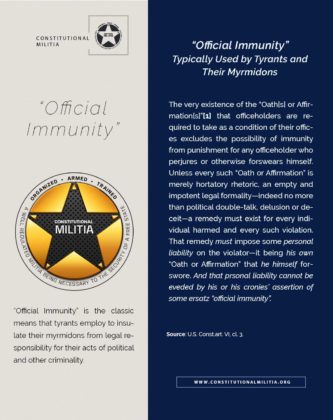Last Updated on January 16, 2023 by Constitutional Militia
“Official Immunity”
The Constitution itself provides for one and only one “official immunity”, in its allowance that, “for any Speech or Debate in either House [of Congress], [Senators and Representatives] shall not be questioned in any other place”.[1] Talk alone by those officers in that particular setting only is thus absolutely privileged, no matter how obnoxious, because thoroughgoing “Speech or Debate” should dissuade any honest member of Congress from voting for an unconstitutional statute.
“Official Immunity”: The Constitution Calls for One, and Only One, “Official Immunity”
If, for purposes of argument, public officials are properly engaged in a “war on terrorism”, those among them who turn out to be rogues should be liable to prosecution and punishment for any “war crimes” they commit in the course of that “war”—or, in light of their repeated, strident, and self-satisfied assertions that “the ” is legitimate, they should at least be stopped from denying and evading their exposure in that regard even if “the war on terrorism” is bogus. Among recognized “war crimes” are torture and other cruel or inhuman treatment, murder, deportation, and the taking of hostages.[2] So, because the purported powers to kidnap Americans through “extraordinary renditions”, to detain Americans indefinitely in military custody, to torture Americans, and to assassinate Americans are not conceivably constitutional (but indeed are self-evidently anti-constitutional), each and every official who participates in such acts in the course of “the war on terrorism” should be condemned as a “war criminal”.[3]
One can be sure, however, that if ever called to account for their “war crimes” (or any other crimes, for that matter), rogue public officials would stridently assert a supposedly all-embracing “official immunity” that insulated them from every form of personal liability, no matter where and against whom they might have perpetrated their thuggery, or in what tribunal or under what laws they might be charged. Such a defense would at best be effrontery, because:
An implied constitutional power for public officials to create “official immunities” for themselves would allow them to negate the express requirement that “The Senators and Representatives [in Congress] * * * , and the Members of the several State Legislatures, and all executive and judicial Officers, both of the United States and of the several States, shall be bound by Oath or Affirmation, to support this Constitution”[4]—and therefore cannot enter public office in the first instance, or act under color of it thereafter, without first taking and then continually abiding by such “Oath or Affirmation”. So even if by some twisting of words, such an implication could be imputed to some other part of the Constitution, it would fall afoul of the rule that if “an asserted construction of any one provision of the Constitution would, if adopted, neutralize a positive prohibition of that instrument, then * * * such asserted construction is erroneous, since its enforcement would mean, not to give effect to the Constitution, but to destroy a portion thereof”.[5] The Constitution, after all, is not self-contradictory. So the affirmative words “shall be bound by” are are plainly “negative of other objects than those affirmed’; and “an exclusive sense must be given to them, or they have no operation at all”.[6]
No reliance can be placed on the Judiciary. Quite the contrary: The judges themselves fathered the bastard doctrine of “official immunity”[7]—thereby not simply violating their own “Oath[s] or Affirmation[s], to support th[e] Constitution”, but also aiding and abetting all other rogue officials in similar violations.































